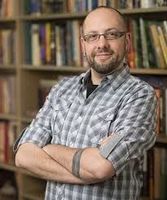Getting to know Daniel Heath Justice: Tolkien, D&D, and The Golden Girls
Acclaimed scholar and author Daniel Heath Justice's Why Indigenous Literatures Matter (Wilfrid Laurier University Press) is a tour de force, combining cultural history, literary analysis, and artistic passion for the vibrant, varied, and deep well of Indigenous literary talent in Canada.
Leanne Betasamosake Simpson praised the book, saying it "simultaneously affirms Indigenous writing, introduces Indigenous readers to the canon of Indigenous writing, and teaches non-Indigenous folks how to read our literatures... Why Indigenous Literatures Matter was an honour to read. It is instructional without instructing, grounded, confident, affirming, generous, brilliant, clear and joyful."
Justice asks essential questions through a lens of lived experience and Indigenous tradition: How are we to live, and to treat one another? How do we tell stories? He also challenges readers to re-think potential assumptions about Indigenous writing and politics. A great volume for readers new to exploring these conversations as well as those who have read widely on the subject, Why Indigenous Literatures Matter is suffused with Justice's wit, clarity, and authenticity on every page.
For Justice's fans, it will be no surprise that his responses to our Dirty Dozen questionnaire, where we try to get to know writers on a personal level, are characteristically memorable and relatable. He tells us about family history, a childhood nickname that stuck, and how much he owes to Dorothy, Blanche, Rose, and Sophia.
- I’m a lifelong Dungeons & Dragons geek, and three of the main characters in my fantasy novel, The Way of Thorn and Thunder, were my first three player characters: Tarsa, Tobhi, and Denarra.
- My third-great-grandfather, James Spears, was a signatory of the 1839 Cherokee Nation reunification constitution and a lifelong ally of our great nineteenth-century Principal Chief, John Ross. He signed with an X.
- I’m the third generation of my mom’s mining family to grow up in the Gold Rush mining town of Victor, Colorado, which sits at around 10,000 feet in the Rockies in the southern periphery of Pikes Peak. In fact, my mother’s father worked in gold, coal, and uranium mines all his life and died of silicosis acquired from uranium mining.
- My nickname growing up was Booner—it’s still how most of the people from my hometown know me. (It was inspired the white frontiersman Daniel Boone who, unbeknownst to my parents, was notorious during his lifetime for his violent hatred of Cherokees!)
- I can make a relevant Golden Girls reference for nearly any life situation. In fact, some of my wittiest comments in conversation are not actually original but repurposed riffs from Dorothy, Blanche, Rose, and Sophia.
- I’m an amateur ventriloquist, and I have a badger puppet named Digdug.
- I used to be a card-carrying member of the Savage Garden fan club.
- My first great pop-culture obsession was He-Man and the Masters of the Universe—both toy line and cartoon—and I still get an electric charge when Prince Adam holds up his sword and chants, “By the Power of Grayskull!”
- I’m a crack shot with a .22 calibre rifle, especially offhand and with open sights.
- Had I been born a girl my name would have been Pepper Lynn Justice. I’m fascinated by what that woman’s story would have been!
- My personal theme song is Dolly Parton’s “Wildflowers,” especially her version with Emmylou Harris and Linda Ronstadt.
- Of the fantasy writers who had the most profound influence on my sense of imaginative possibility—J.R.R. Tolkien, Octavia Butler, and Ursula K. Le Guin—I count myself incredibly blessed to have met Butler and corresponded with Le Guin. And both were incredibly encouraging in those brief interactions. Their unarguable talent and determined imagining of worlds that included people like me remain every bit as inspiring as their personal generosity to this starry-eyed young writer.
______________________________
Your CanLit News
Subscribe to Open Book’s newsletter to get local book events, literary content, writing tips, and more in your inbox
Daniel Heath Justice (Cherokee Nation) is Canada Research Chair in Indigenous Literature and Expressive Culture at the University of British Columbia. A widely published scholar in Indigenous literary studies, he is the co-editor of the groundbreaking Oxford Handbook of Indigenous American Literature (2014) and author of a Cherokee literary history, a cultural history of badgers, and an Indigenous epic fantasy series.





